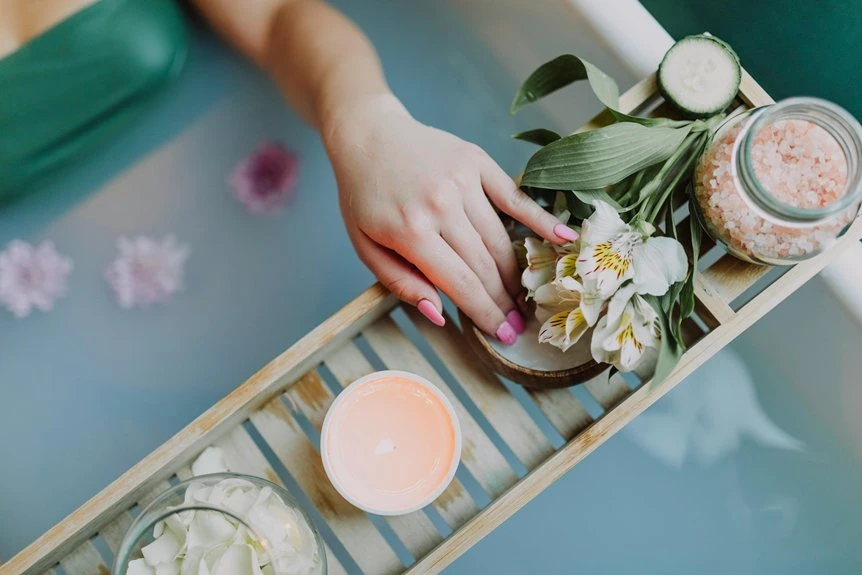
You know that voice in your head that’s constantly critiquing everything you do? Yeah, that one’s got to go. Self-love isn’t about bubble baths and face masks, though those don’t hurt. It’s about building daily habits that actually make you feel good about yourself, instead of running on empty and wondering why you’re always exhausted. These 14 practices will help you stop being your own worst enemy and start showing up differently.
Key Takeaways
- Journal regularly to understand your emotions and identify triggers that cause self-doubt or negative reactions.
- Create mood-specific playlists to quickly shift your emotional state and boost your energy throughout the day.
- Align daily choices with your core values and set boundaries to protect activities that energize you.
- Establish a personal safe space where you can practice self-care consistently without judgment or distractions.
- Learn to say no to requests by implementing a 24-hour decision rule and protecting your energy capacity.
Get to Know Your Big Emotions
Every single day, we’re hit with a whole parade of emotions, and honestly, most of us handle them about as gracefully as a toddler having a meltdown in Target. But here’s the thing—paying attention to those big feelings instead of shoving them down is actually an act of self-love.
When anger, envy, or those negative thoughts start flooding your body and mind, grab a journal. I know, I know—journaling sounds about as fun as doing taxes, but it works. Write down what you’re feeling and dig deeper. Ask yourself why you’re really mad or jealous.
Sometimes you’ll uncover uncomfortable truths about yourself, and that’s okay. Learning about your emotions, even the messy ones, gives you real power over your reactions. Consider asking yourself when you feel most insecure, as examining situations that trigger self-doubt can help you identify areas where confidence needs strengthening.
Create a Mood-Boosting Playlist
While we’re talking about dealing with big emotions, let’s be real—sometimes you’re just not ready to plunge into the deep end of your feelings, and that’s totally fine. Creating a mood-boosting playlist is your secret weapon for those moments when you need to shift gears fast.
I learned this trick after spending way too many evenings spiraling over work drama. Now I’ve got three go-to playlists: “Power Up” (think Lizzo and Beyoncé), “Chill Vibes” (acoustic covers and indie folk), and “Feel Good Classics” (basically my high school favorites that make me feel invincible).
The magic happens when you make these playlists before you need them. When tough emotions hit, you’ll help yourself bounce back faster instead of doom-scrolling through sad songs. Creating a romantic playlist can really lift your mood and add a touch of romance to your self-care routine.
Do What’s Meaningful to You

When you’re constantly doing things that feel empty or forced, it’s like wearing clothes that don’t fit—technically functional, but deeply uncomfortable. The secret to genuine self-love lies in identifying what truly matters to you, whether that’s creativity, helping others, or building authentic connections, then actually aligning your daily choices with those values.
I spent years saying yes to networking events I hated because I thought I “should,” but once I started volunteering at the animal shelter instead, I felt more energized and authentic than I’d in months. Remember that small steps toward what feels meaningful can create significant changes in how you experience and value yourself.
Identify Your Core Values
Living according to your core values sounds like one of those fancy self-help concepts that belongs on a vision board, but I promise it’s more practical than it seems. When you practice identifying what truly matters to you, you’ll pay attention to patterns in your decisions that either energize or drain you.
I spent three months tracking my daily choices and noticed something powerful: setting boundaries became easier when I knew my non-negotiables. Making decisions stopped feeling overwhelming because I had my internal compass ready.
| Value | Daily Practice | Boundary Example |
|---|---|---|
| Integrity | Honest communication | No gossip conversations |
| Growth | 30-minute learning | Declining mindless scrolling |
| Connection | Quality time | Phone-free dinners |
| Creativity | Morning pages | Protecting creative hours |
| Health | Movement priority | Saying no to energy drains |
Practice gratitude for this self-discovery process—it’s genuinely life-changing.
Align Actions With Purpose
Knowing your values is only half the battle—now comes the fun part of actually living them out in real life. When you pay attention to decisions that spark genuine excitement, you’re wielding serious power over your happiness. I started blocking two hours every Saturday for creative projects, and honestly, it changed everything about how I look forward to weekends.
Try this: before saying yes to anything, ask yourself if it aligns with your core values. Does volunteering at the animal shelter make you feel energized? Do it. Does that networking event drain your soul? Skip it without guilt.
These aligned choices help you create a life that feels authentically yours—something nice in a world full of should-dos.
Make a Safe Space for Yourself
Although it might sound overly simple, creating your own safe space became one of the most powerful self-love practices I ever stumbled upon. Your bedroom, car, or even shower can become your sanctuary where you take care of yourself without judgment from others.
Make sure this space makes you feel completely at peace. Whether it’s part of your morning routine with coffee or tea, or your evening wind-down spot, this important part of taking care of yourself deserves attention. Simply say no to distractions here – phones, to-do lists, even friends and family can wait.
I’m going to spend some time in my safe space daily, paying attention to what good things help us recharge. Practice self-love by creating somewhere that’s entirely yours. The best self-care routine is the one you’ll actually do, so make your safe space accessible and consistent over intensity rather than trying to create something perfect.
Know When to Say No

You know that feeling when someone asks you to do something and you’re technically free, but just thinking about it makes you want to hide under a blanket? That’s your energy telling you it’s time to practice one of the hardest self-love skills: saying no without guilt.
Learning to protect your energy and set healthy boundaries isn’t selfish, it’s actually the key to showing up as your best self for the people and activities that truly matter to you. Consider taking a digital detox day to step away from the constant requests and notifications that make boundary-setting even more challenging.
Protecting Your Energy
When someone asks for “just a tiny favor” that’ll take “only five minutes,” I’ve learned that it’s usually code for a two-hour commitment that’ll drain my energy faster than my phone battery on 1%.
You’ve got to protect your energy like it’s your most valuable currency—because it is. I started setting “Do Not Disturb” hours from 7-9 AM and 6-8 PM daily. When people text asking if I’m going to random events, I give myself 24 hours before responding. This simple delay helps me check in with my actual energy levels, not just my people-pleasing impulses.
Your energy reserves aren’t unlimited, so guard them fiercely.
Setting Healthy Boundaries
Since I’ve become the unofficial “yes person” in my friend group, I’ve had to learn the hard way that saying no isn’t mean—it’s necessary. You’re not a bad friend for protecting your energy, and boundaries aren’t walls—they’re gates you control.
- Practice the 24-hour rule – Don’t commit immediately, give yourself time to think
- Set communication windows – I only check texts between 9 AM and 8 PM now
- Create energy budgets – Limit yourself to two social events per week maximum
- Use scripts – “I can’t commit to that right now” works every time
Your capacity isn’t unlimited, and honoring it actually makes you more reliable for what truly matters.
Say Something Nice in the Mirror
Mirror work might sound like something from a self-help book you’d secretly hide under your bed, but it’s actually one of the most straightforward ways to practice self-love. You’re literally looking yourself in the eye and saying something positive. It’s like giving yourself a pep talk before facing whatever chaos awaits outside your bathroom door.
| What You Say | Why It Works |
|---|---|
| “I handled that tough conversation well yesterday” | Acknowledges real achievements |
| “I’m grateful I can laugh at my mistakes” | Celebrates authentic qualities |
| “My persistence is paying off” | Reinforces positive traits |
| “I’m proud of how I’m growing” | Counters negative self-talk |
This practice challenges your brain’s tendency to pick yourself apart and sets a powerful tone for your entire day. Like other mindfulness practices, mirror work requires consistent effort to develop into a meaningful habit that supports your overall well-being.
Schedule Mini Check-Ins With Yourself
Between complimenting yourself in the mirror and rushing off to conquer the world, there’s another self-love practice that takes literally thirty seconds but pays dividends all day long.
Between your morning coffee and evening collapse, there’s a thirty-second self-care ritual that transforms your entire day.
Schedule mini check-ins with yourself throughout the day. I’m talking about quick emotional temperature checks that prevent you from hitting that inevitable 3 PM wall of exhaustion and existential dread.
Here’s how to make it work:
- Set three phone alarms – morning, midday, and evening
- Ask yourself two questions – “How am I feeling?” and “What do I need?”
- Take one immediate action – drink water, stretch, or take five deep breaths
- Acknowledge your current state without judgment or criticism
This micro-habit empowers you to make proactive decisions before burnout sneaks up and ruins your momentum.
Consider starting your first check-in during those precious quiet morning hours when you can focus entirely on yourself before the demands of the day begin.
Pivot From Your Inner Critic
catch that critic red-handed and flip the script. When you notice harsh self-talk starting, pause for three seconds and ask, “Would I say this to my best friend?” The answer’s always no.
Replace “I’m terrible at this” with “I’m learning something new.” Transform “I always mess up” into “I made one mistake, and that’s human.” Keep a running list of three daily wins in your phone. When your inner critic gets loud, read them back. You’re rewiring decades of programming, so be patient with yourself.
This practice of thoughtful self-talk activates your prefrontal cortex, the brain region responsible for executive function and resilience, helping you build stronger mental habits over time.
Notice Your Self-Talk

You’ll probably catch yourself thinking some pretty harsh stuff once you start paying attention to that voice in your head, like “I’m such an idiot” or “I always mess everything up.”
The trick is recognizing these patterns when they happen, then challenging that inner critic with questions like “Would I say this to my best friend?” Once you notice how mean you’re being to yourself, you can start reframing those thoughts into something more helpful, turning “I’m terrible at this” into “I’m still learning this skill.”
This practice of gentle self-awareness helps you develop self-compassion by responding to your inner dialogue with the same understanding you’d offer a close friend facing similar struggles.
Identify Negative Patterns
When I started paying attention to my inner dialogue last year, I discovered something pretty shocking – I was basically running a 24/7 mean girl commentary in my head. Individuals have likely got similar patterns running on repeat too.
- The Perfectionist Voice – “That presentation wasn’t good enough, everyone probably thinks you’re incompetent”
- The Comparison Trap – “She’s so much more successful than you’ll ever be”
- The Catastrophizer – “You’re going to fail and lose everything”
- The Body Critic – “You look terrible in that outfit”
Once you start recognizing these patterns, you’ll catch yourself mid-criticism. That awareness alone gives you the power to interrupt the cycle.
Challenge Inner Critic
Once you’ve spotted those negative patterns, it’s time to fight back against that mean voice in your head – and trust me, it’s going to put up a serious fight.
When your inner critic starts its usual nonsense, interrupt it immediately. Say “stop” out loud if you have to – yes, you’ll look weird, but it works. Replace harsh words with kinder ones. Instead of “I’m such an idiot,” try “I made a mistake, and that’s how I learn.” This isn’t about being fake-positive, it’s about being fair to yourself.
I spent years calling myself lazy when I was actually overwhelmed. Now I ask, “What would I tell my best friend?” That simple question changes everything.
Reframe Harsh Thoughts
Fighting back is just the first step – now you need to become a detective of your own mind, catching those sneaky thoughts before they spiral out of control.
Here’s your reframing toolkit:
- Swap “I’m terrible at this” with “I’m learning this” – transforms failure into progress
- Replace “I always mess up” with “I made a mistake this time” – stops catastrophic thinking
- Change “I’m not good enough” to “I’m growing stronger” – shifts focus to improvement
- Turn “Everyone’s judging me” into “Most people aren’t thinking about me” – reality check engaged
You’ll catch yourself mid-spiral within two weeks of practice. When that harsh voice pipes up, pause and ask, “Would I talk to my best friend this way?” Then speak to yourself with that same compassion.
Practice Self-Compassion
Although we’re often our own harshest critics, learning to practice self-compassion can completely transform how we navigate life’s inevitable bumps and bruises. Think of it as becoming your own best friend instead of that annoying inner voice that won’t shut up.
Research proves self-compassion reduces anxiety and depression while boosting life satisfaction. Here’s how you can develop this superpower: write yourself a compassionate letter when you’re struggling, like you’d comfort a friend going through the same situation. Speak to yourself with kindness, acknowledging that everyone makes mistakes and faces challenges.
This isn’t about making excuses or going soft on yourself. It’s about recognizing your shared humanity and building emotional resilience that’ll serve you when life gets messy. When you notice catastrophic thinking creeping in about your perceived failures or shortcomings, challenge these disaster predictions by questioning the evidence and replacing harsh self-judgment with the same understanding you’d offer a close friend.
Celebrate Small Wins
When you managed to drink eight glasses of water yesterday or finally organized that one messy drawer, you probably brushed it off as “no big deal.” But here’s the thing – those tiny victories deserve just as much recognition as landing your dream job or running a marathon.
Your brain craves acknowledgment, and celebrating small wins creates momentum that propels you toward bigger goals. Here’s how to master this power move:
- Document your daily wins – Write down three accomplishments each evening, even if it’s just making your bed
- Avoid the comparison trap – Your progress isn’t measured against anyone else’s highlight reel
- Reframe setbacks – That “failed” workout attempt? You still showed up
- Savor the moment – Pause and actually feel proud of yourself
Small celebrations build unstoppable confidence.
Set Healthy Boundaries
Setting healthy boundaries isn’t about building walls around yourself like some emotional fortress, it’s about creating space for what truly matters to you.
When you learn to say no to that extra project, communicate your actual availability instead of pretending you’re superhuman, and protect your energy like it’s your phone battery at 5%, you’re not being selfish. You’re simply recognizing that your time, emotions, and mental space are valuable resources that deserve the same protection you’d give your wallet or your favorite coffee mug.
Learn to Say No
One of the hardest lessons I learned in my twenties was that saying “yes” to everything wasn’t making me popular—it was making me exhausted, broke, and secretly resentful of everyone around me.
Learning to say no became my superpower. Here’s how you can master it too:
- Practice the pause – Say “Let me check my calendar and get back to you” instead of automatic yes responses
- Use the broken record technique – Repeat your no calmly without over-explaining or justifying
- Offer alternatives when possible – “I can’t do Saturday, but how about next Tuesday?”
- Remember your why – Every yes to something you don’t want is a no to something you do
Your time and energy aren’t unlimited resources, so guard them fiercely.
Communicate Your Limits
Saying no is just the first step—now you need to actually communicate what you will and won’t accept from the people in your life. Clear boundaries aren’t suggestions, they’re non-negotiable rules that protect your sanity and energy.
| Boundary Type | What to Say | When to Use |
|---|---|---|
| Time Limits | “I’m available until 6 PM weekdays” | Work calls/meetings |
| Energy Protection | “I can’t discuss drama right now” | Toxic conversations |
| Financial Boundaries | “My budget doesn’t allow that” | Expensive requests |
| Personal Space | “I need alone time on Sundays” | Social obligations |
| Work-Life Balance | “I don’t check emails after hours” | Professional demands |
Don’t apologize for having standards. State your limits firmly, then stick to them consistently. People will test your boundaries initially, but they’ll respect you more when you hold your ground.
Protect Your Energy
Your energy is like a smartphone battery—precious, limited, and constantly being drained by apps you forgot were running in the background. You’ve got to become ruthless about what gets access to your power source.
Here’s how I started protecting my energy like a bouncer at an exclusive club:
- Block 2-hour windows for yourself daily—no meetings, calls, or favors allowed
- Limit draining conversations to 15 minutes max (yes, even with family)
- Say no to three requests this week, even if you’re technically free
- Take 24-hour breaks from social commitments when you feel overwhelmed
I used to feel guilty declining invitations when I’d nothing scheduled. Now I realize that “nothing” is actually self-care time, and it’s non-negotiable.
Ground Yourself in the Present Moment

When anxiety starts creeping in and your mind begins racing like a hamster on a wheel, grounding yourself in the present moment becomes your secret weapon for finding peace. I’ve discovered that taking five deep breaths, counting slowly from one to five, instantly pulls me back from whatever mental rabbit hole I’ve fallen into.
Walking outside for just ten minutes works wonders too. I focus on three things I can see, two sounds I hear, and one smell around me. It’s like hitting a reset button on my scattered thoughts.
Playing nature sounds while writing in my gratitude journal has become my evening ritual. I list three good things from my day, no matter how small. Even “my coffee didn’t taste like dirt today” counts.
Treat Yourself With Kindness
The harsh inner critic living rent-free in my head used to have a field day every time I messed up, and I bet yours does too.
Self-kindness isn’t about being soft—it’s about building unshakeable confidence through compassion. When you treat yourself with the same care you’d show your closest friend, you open up serious power.
- Replace harsh self-talk with encouraging words like “I’m learning” instead of “I’m stupid”
- Forgive yourself for mistakes within 24 hours instead of ruminating for weeks
- Celebrate small wins daily, even finishing that annoying email
- Schedule guilt-free activities that recharge you, whether it’s a $5 coffee or 20-minute walk
Conclusion
You’ve got nine solid practices to start building real self-love habits that actually stick. Pick just two or three that feel right for your life right now, and don’t try to master everything at once—that’s a recipe for burnout. Start small, like setting one boundary this week or creating that playlist you’ve been putting off. Recall, self-love isn’t selfish; it’s necessary for showing up as your best self.





Leave a Reply